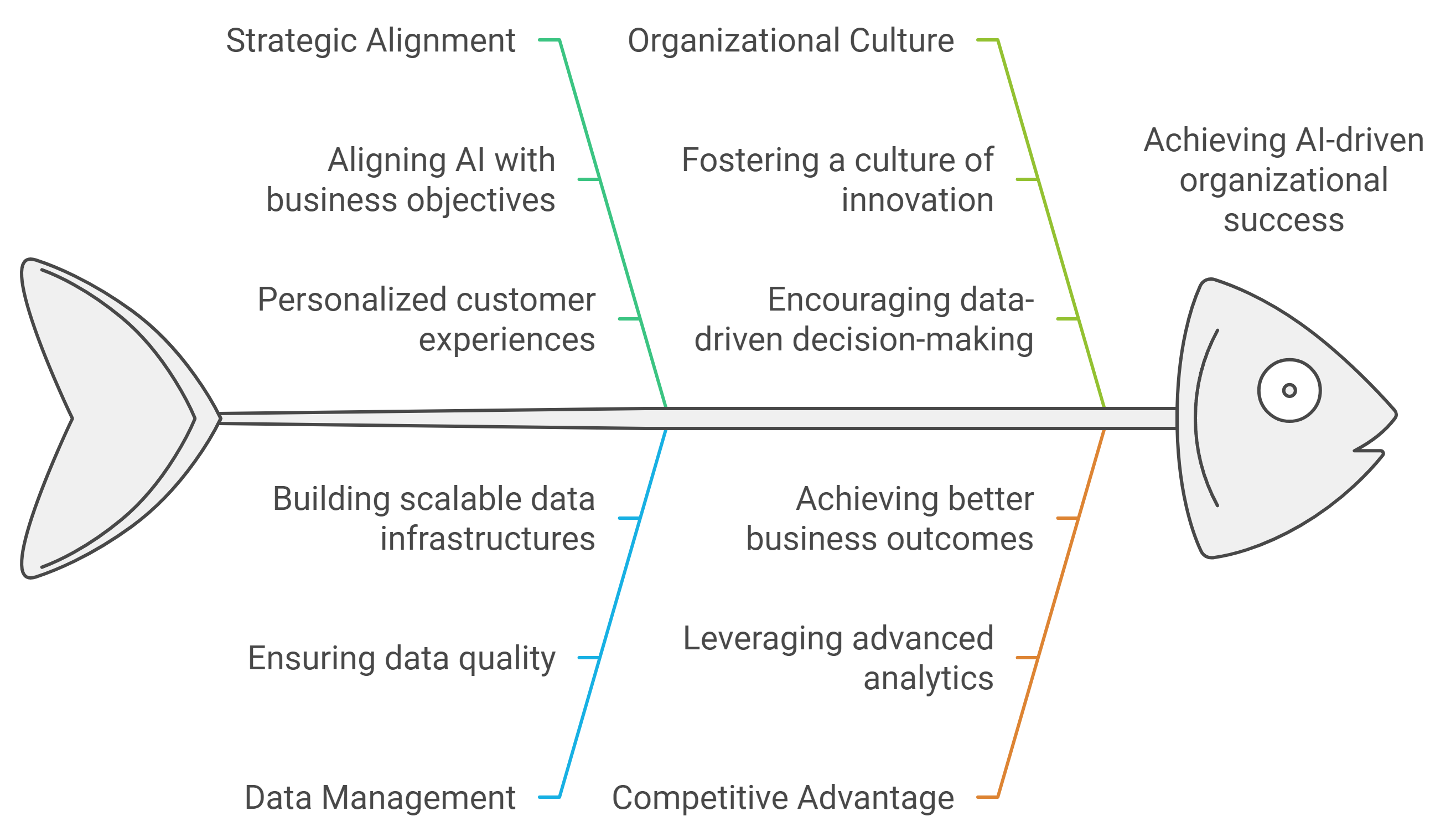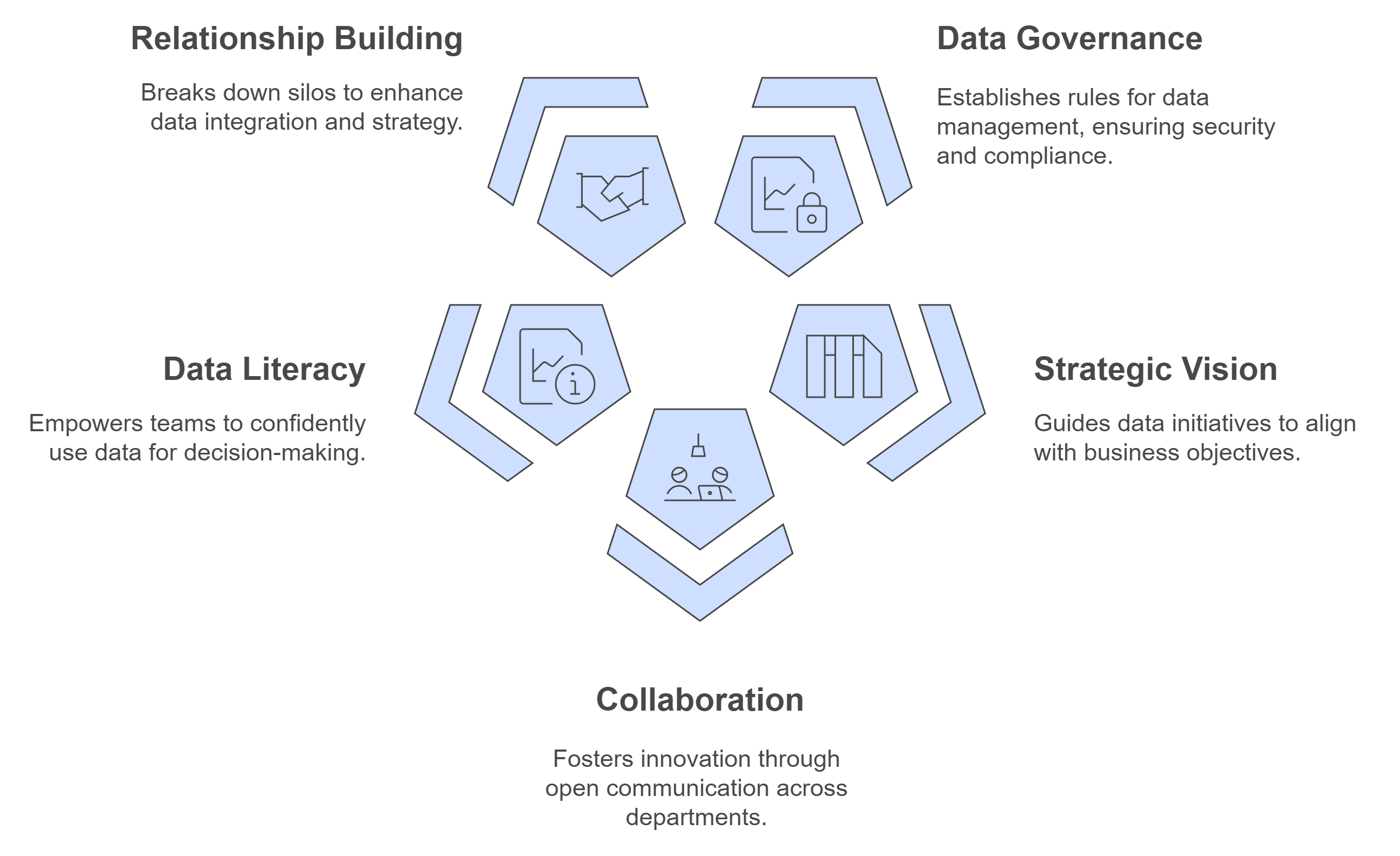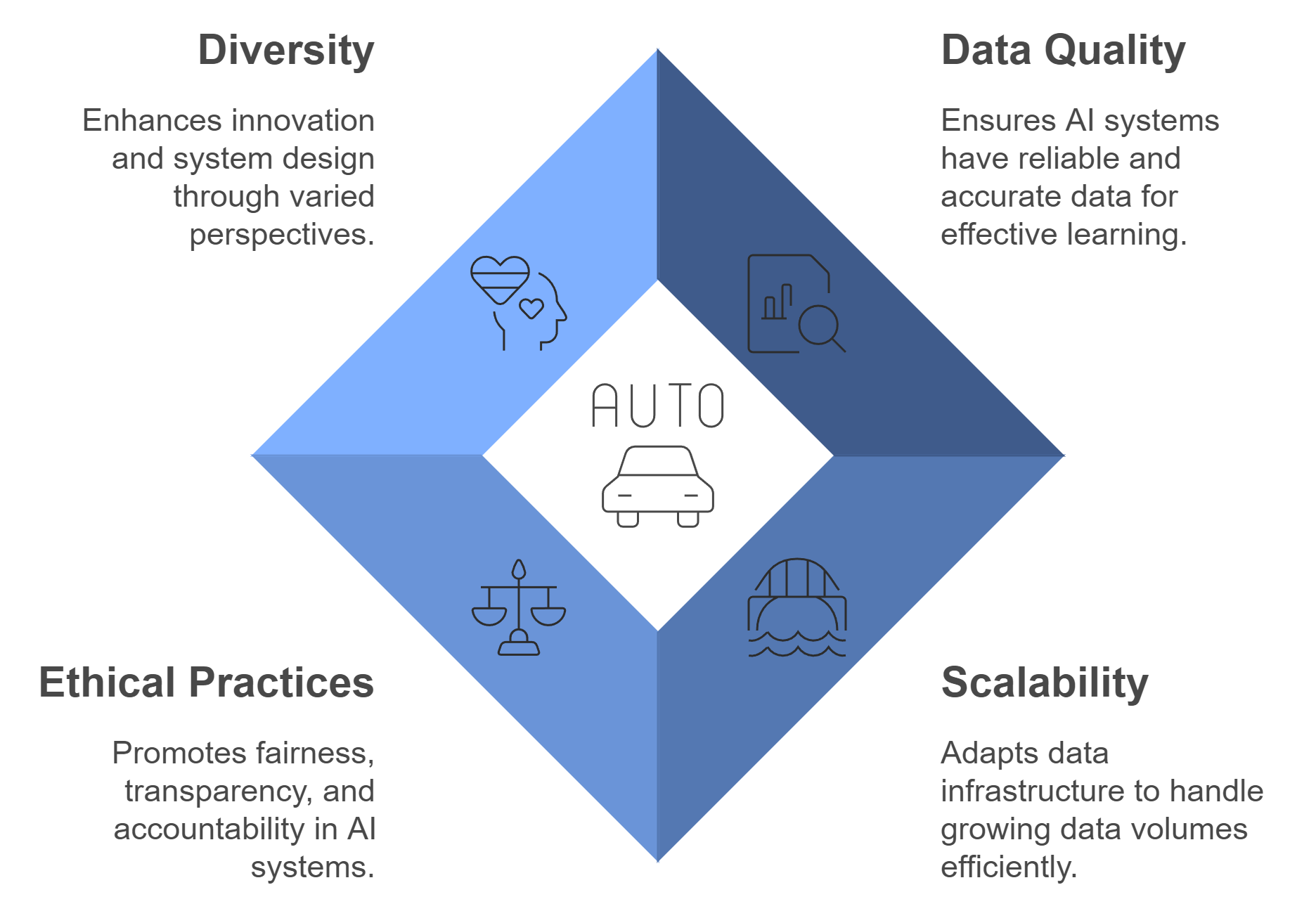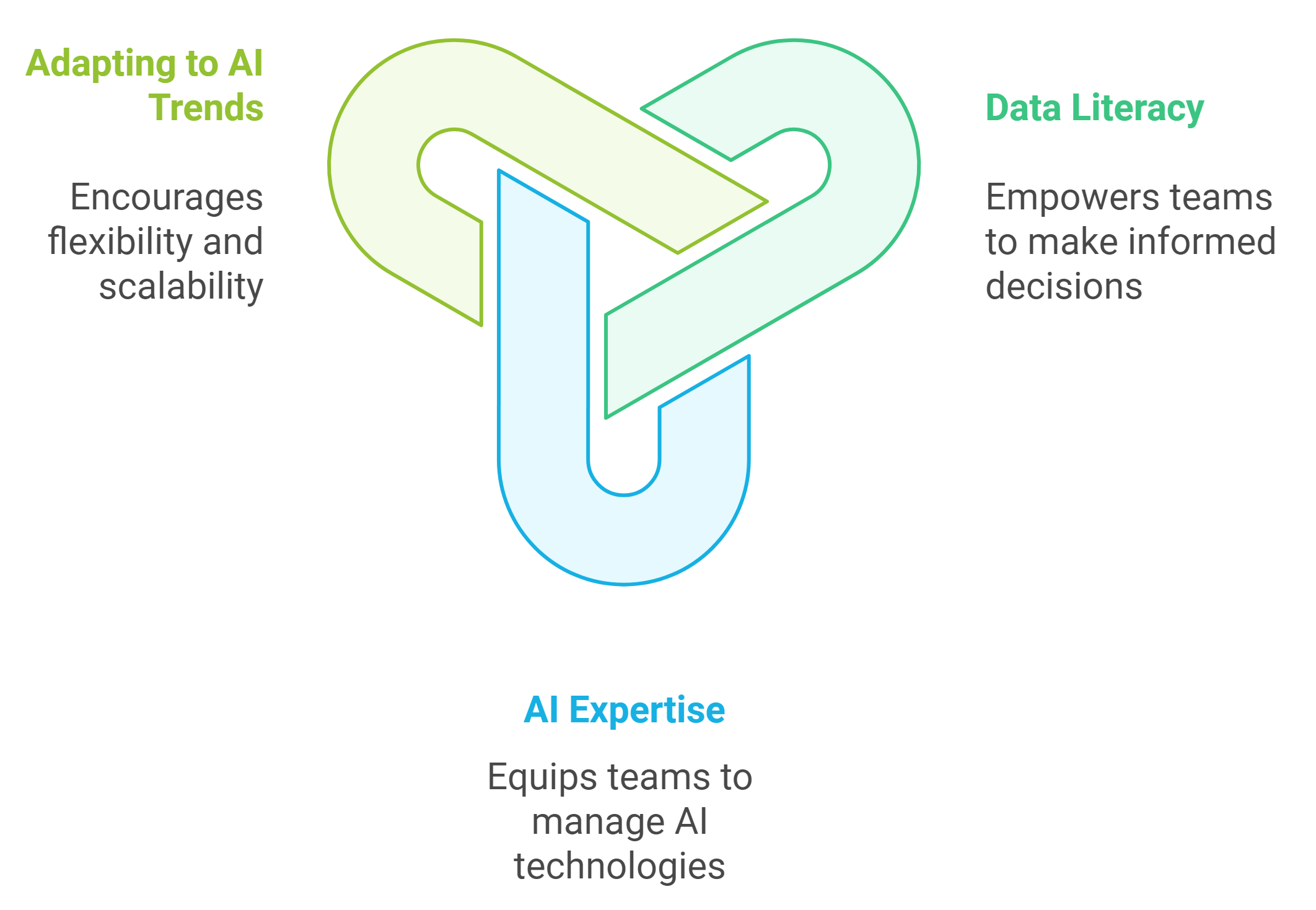Harnessing the Power of Data Leadership in the Age of AI
Data leadership plays a pivotal role in shaping the success of AI initiatives. As industries increasingly adopt AI, the ability to manage and utilize data effectively has become a critical factor for staying competitive. For instance, 59% of companies have already implemented AI, with many reporting significant productivity gains. Businesses like Netflix demonstrate how aligning AI with strategic goals can revolutionize operations, offering personalized experiences that drive customer satisfaction. By focusing on robust data strategies, organizations achieve 54% better outcomes, showcasing the transformative power of integrating data into decision-making processes.

Key Takeaways
Data leadership is crucial for the success of AI initiatives; organizations must prioritize effective data management to stay competitive.
Establishing strong data governance frameworks ensures data accuracy, security, and compliance, building trust with stakeholders.
Impactful data leaders foster a culture of collaboration and data literacy, empowering teams to make informed decisions.
High-quality data is the foundation of successful AI systems; prioritize data preparation to enhance the reliability of AI insights.
Investing in advanced analytics tools can unlock valuable insights, helping organizations optimize operations and drive innovation.
Diversity in teams enhances AI development, leading to more innovative solutions and better outcomes for all users.
Continuous learning and adaptability are essential for navigating the rapidly evolving AI landscape and maximizing its benefits.
Defining Data Leadership and Artificial Intelligence

Understanding Data Leadership
The strategic role of data governance in modern organizations.
Data governance forms the backbone of effective data leadership. It ensures that your organization manages, secures, and utilizes data responsibly. Without a clear governance framework, data can become fragmented and unreliable, leading to poor decision-making. Strong governance establishes rules for data collection, storage, and usage, ensuring consistency and compliance with regulations. This approach not only protects your organization but also builds trust with stakeholders.
Trist, a seasoned expert in data leadership, highlights the importance of fostering a culture that values data-driven decision-making. He emphasizes that data teams should move beyond being service providers to becoming strategic partners. By implementing robust governance practices, you can empower your teams to deliver actionable insights that align with business goals.
Characteristics of impactful data leaders.
Impactful data leaders possess a unique blend of technical expertise and strategic vision. They understand the value of data and know how to leverage it for organizational success. These leaders prioritize collaboration across departments, ensuring that data initiatives align with broader business objectives. They also champion data literacy, helping teams at all levels feel confident in using data to make decisions.
Effective data leaders focus on building relationships. They break down silos and encourage open communication between data teams and other departments. This collaborative approach fosters innovation and ensures that data becomes a central part of your organization's strategy. Are you cultivating these qualities in your leadership style?
Exploring Artificial Intelligence
Key AI technologies and their applications in business.
Artificial intelligence is transforming industries by enabling businesses to solve complex problems and improve efficiency. Technologies like machine learning, natural language processing, and computer vision are at the forefront of this revolution. Machine learning helps you analyze vast amounts of data to uncover patterns and make predictions. Natural language processing allows systems to understand and respond to human language, enhancing customer interactions. Computer vision enables machines to interpret visual data, opening new possibilities in fields like healthcare and manufacturing.
For example, AI-powered chatbots improve customer service by providing instant responses to inquiries. Predictive analytics helps retailers optimize inventory management, reducing waste and increasing profitability. By integrating these technologies, your organization can gain a competitive edge and drive innovation.
The foundational role of data in AI systems.
Data serves as the foundation for all AI systems. Without high-quality data, AI models cannot deliver accurate or meaningful results. Data preparation, including cleaning, labeling, and organizing, is essential for training AI algorithms. This process ensures that your AI systems can learn effectively and provide reliable insights.
The intersection of artificial intelligence and data science highlights the critical role of data leadership in AI success. As a data leader, you must prioritize data quality and establish processes for continuous improvement. By doing so, you enable your organization to harness the full potential of AI technologies.
The Intersection of Artificial Intelligence and Data Science

How Data Leadership Fuels AI Innovation
Ensuring data quality and preparation for AI success.
AI systems thrive on high-quality data. Without it, predictions falter, and insights lose their reliability. As a leader, you must prioritize maintaining quality data to ensure your AI initiatives succeed. According to a Forbes study, organizations that focus on data quality achieve better outcomes from their AI systems. This involves cleaning, organizing, and labeling data to make it usable for machine learning models. These steps help your AI systems learn effectively and deliver accurate results.
Data preparation also plays a critical role in ethical AI implementation. Poorly prepared data can lead to biased outcomes, damaging trust and credibility. By investing in robust data management practices, you create a foundation for AI systems that are both reliable and fair. This approach not only enhances the performance of your AI projects but also aligns them with your organizational values.
Building scalable data infrastructures for AI-driven projects.
Scalability is essential for AI innovation. As your organization grows, your data infrastructure must adapt to handle increasing volumes of information. Building scalable systems ensures that your AI projects can evolve without disruption. Leaders who invest in flexible data infrastructures enable their teams to process and analyze data efficiently, even as demands increase.
For example, predictive analytics relies on vast amounts of data to generate actionable insights. A scalable infrastructure allows you to integrate these tools seamlessly into your operations. This capability empowers your organization to make informed decisions and stay ahead of competitors. By prioritizing scalability, you position your business for long-term success in the age of AI.
Ethical and Inclusive AI Practices
Addressing fairness, transparency, and accountability in AI.
Ethical AI practices begin with fairness. You must ensure that your AI systems treat all users equitably, avoiding biases that could harm certain groups. Transparency is equally important. Stakeholders need to understand how your AI systems make decisions. Clear documentation and open communication build trust and foster accountability.
Accountability requires you to take responsibility for the outcomes of your AI systems. This includes addressing errors and continuously improving your processes. By embedding these principles into your AI initiatives, you create systems that reflect your organization's commitment to ethical practices. This approach not only enhances trust but also strengthens your reputation in the marketplace.
The role of diverse perspectives in AI development.
Diversity drives innovation. Including varied perspectives in AI development leads to more creative solutions and better outcomes. Teams with diverse backgrounds bring unique insights, helping you identify potential biases and improve system design. This inclusivity ensures that your AI systems serve a broader audience effectively.
For instance, diverse teams can identify cultural nuances that might otherwise go unnoticed. These insights enhance the usability and relevance of your AI applications. By fostering an inclusive environment, you unlock the full potential of your team and create AI systems that resonate with a global audience.
Driving Organizational Change Through Data Leadership
Cultivating a culture of innovation and experimentation.
Innovation thrives in environments that encourage experimentation. As a data leader, you must inspire your team to explore new ideas and take calculated risks. This mindset fosters creativity and drives progress in AI initiatives. Providing resources and support for experimentation empowers your team to push boundaries and discover groundbreaking solutions.
Encouraging collaboration across departments also fuels innovation. When teams share knowledge and insights, they uncover opportunities for improvement and growth. By cultivating this culture, you position your organization as a leader in the intersection of artificial intelligence and data science.
Aligning AI initiatives with strategic business objectives.
AI projects must align with your organization's goals to deliver maximum value. Clear communication between data teams and leadership ensures that AI initiatives support broader business strategies. This alignment helps you allocate resources effectively and measure the impact of your efforts.
For example, integrating AI into customer service can enhance satisfaction and loyalty. By focusing on strategic objectives, you ensure that your AI projects contribute to your organization's success. This approach not only maximizes ROI but also strengthens your competitive position in the market.
Actionable Strategies for Effective Data Leadership in AI

Best Practices for Data-Driven Decision-Making
Establishing robust data governance frameworks.
Strong data governance frameworks form the foundation of effective data leadership. These frameworks ensure that your organization collects, stores, and uses data responsibly. By implementing clear policies, you can maintain data accuracy, security, and compliance with regulations. This approach not only protects your organization but also builds trust with stakeholders.
To establish robust governance, focus on creating standardized processes for data management. Define roles and responsibilities for your team to ensure accountability. For example, appointing data stewards can help monitor data quality and enforce governance policies. A well-structured framework enables you to make data-driven decisions confidently, driving better outcomes for your organization.
"73% of data leaders feel excluded from strategic decisions." Addressing this gap through governance ensures that data teams play a central role in shaping business strategies.
Leveraging advanced analytics for strategic insights.
Advanced analytics unlocks valuable insights from data, enabling you to make informed decisions. Tools like predictive analytics and machine learning provide actionable insights by identifying patterns and trends. These insights help you anticipate challenges, optimize operations, and seize new opportunities.
For instance, retailers use advanced analytics to forecast demand and manage inventory efficiently. In healthcare, data analytics improves patient care by identifying risk factors and personalizing treatments. By leveraging these tools, you can transform raw data into a strategic asset that drives innovation and growth.
Real-World Examples of Success
Case studies of organizations excelling at the intersection of AI and data science.
Organizations that embrace the synergy between data and AI achieve remarkable success. Netflix, for example, uses machine learning and natural language processing to deliver personalized recommendations. This approach enhances customer satisfaction and boosts retention rates. Similarly, financial institutions leverage AI techniques to detect fraud and improve cybersecurity.
These examples highlight the benefits of AI when paired with strong data leadership. By aligning AI initiatives with business goals, these organizations have gained a competitive edge. Their success underscores the importance of integrating data and AI into your strategic planning.
Lessons learned from implementing data leadership in AI projects.
Implementing data leadership in AI projects offers valuable lessons. First, prioritize data preparation for ML to ensure high-quality inputs for your models. Poorly prepared data can lead to inaccurate predictions and biased outcomes. Second, foster collaboration between data teams and other departments. This synergy promotes innovation and ensures alignment with organizational objectives.
Another key lesson is the importance of continuous learning. AI research evolves rapidly, requiring you to stay updated on emerging trends. By adopting these practices, you can maximize the benefits of AI and drive meaningful change within your organization.
Preparing for the Future of Data Leadership

Investing in data literacy and AI expertise across teams.
Data literacy empowers your team to make data-driven decisions confidently. By providing training and resources, you can enhance their ability to interpret and use data effectively. This investment fosters a culture where every employee contributes to your organization's data initiatives.
AI expertise is equally critical. Equip your team with the skills needed to implement and manage AI technologies. Encourage them to explore areas like machine learning and AI and cybersecurity. This knowledge prepares your organization to navigate the complexities of the AI era successfully.
Adapting to emerging AI trends and technologies.
The AI landscape evolves rapidly, presenting both challenges and opportunities. Stay ahead by monitoring advancements in AI research and adopting relevant technologies. For example, explore how generative AI can enhance creativity and problem-solving within your organization.
Flexibility is key to adapting to these changes. Build scalable data infrastructures that can accommodate new tools and techniques. By staying agile, you position your organization to thrive in an ever-changing environment.
Data leadership holds transformative potential in the AI era. By embracing it, you can turn data into a strategic asset that drives innovation and growth. The intersection of artificial intelligence and data science empowers organizations to make informed decisions, improve efficiency, and unlock new opportunities. Leaders who prioritize high-quality data and robust data engineering practices position their teams for success in this rapidly evolving landscape.
Looking ahead, the role of data leadership will continue to evolve. Staying adaptable and fostering a culture of continuous learning will ensure your organization thrives in an AI-driven world. Seize this opportunity to lead with data and shape the future.
See Also
Harnessing Data Leadership For Business Growth And Success
How Data Leadership Influences Organizational Decision Processes
Transitioning From Data Management To Effective Data Leadership
Addressing Obstacles Faced In Data Leadership Roles
Shifting From Traditional BI To AI Insights With Eric Kavanagh
